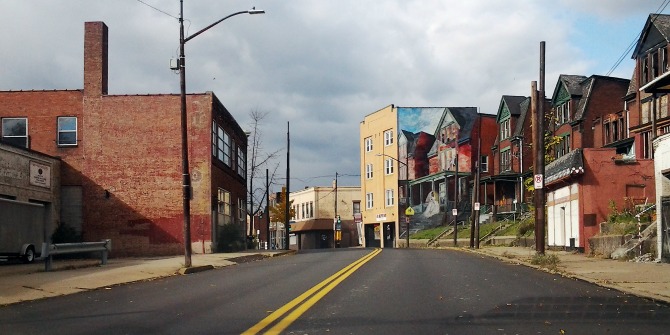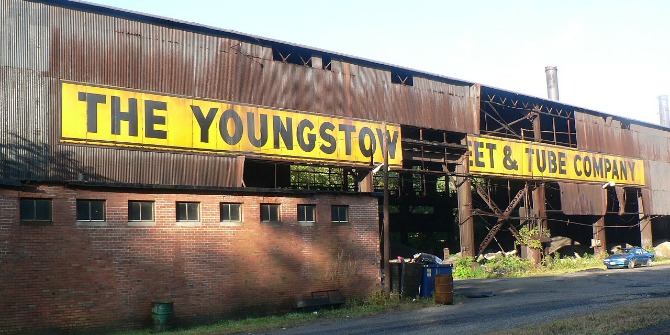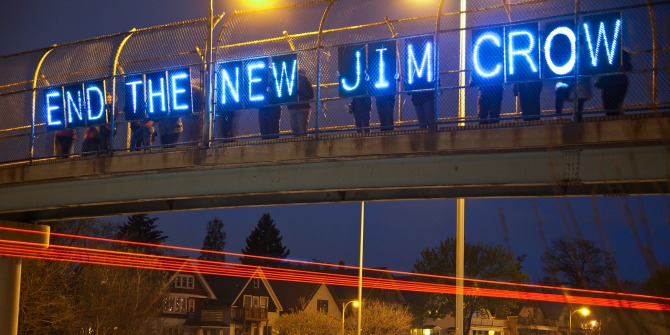 The victories of the Civil Rights movement in the 1960s have paved the way for African-American elected officials, judges, police officers, and presidents. But fifty years on, why has this political representation translated into few positive policy outcomes for African Americans? Michael McQuarrie writes that the reasons for this are many: persistent racist sentiment, general biases in the American polity towards business and rural interests, the declining resources available to municipalities, and most importantly, the geographic concentration of African Americans in areas with smaller electoral footprints –compared to statewide offices – such as House districts and mayoralties.
The victories of the Civil Rights movement in the 1960s have paved the way for African-American elected officials, judges, police officers, and presidents. But fifty years on, why has this political representation translated into few positive policy outcomes for African Americans? Michael McQuarrie writes that the reasons for this are many: persistent racist sentiment, general biases in the American polity towards business and rural interests, the declining resources available to municipalities, and most importantly, the geographic concentration of African Americans in areas with smaller electoral footprints –compared to statewide offices – such as House districts and mayoralties.
The federal government was designed by the framers of the American Constitution in the 18th century to protect minority rights. In the Civil Rights Era of the 1960s this role was deployed against white supremacy in the American South with decisive effect to ensure that first de-segregationist court decisions, and later Civil Rights legislation, did not founder on the shoals of local resistance. We are now in a the era of the “New Jim Crow”, as legal scholar Michelle Alexander calls it, an era in which black Americans are enmeshed in a legal caste system that criminalizes the intersection of poverty and skin color. This caste system outflanks Civil Rights and Voting Rights legislation by making exclusion no longer premised on skin color but on criminality.
Of course, this was always true to an extent, but criminal law and policing have themselves become implicitly racialized. New “crimes” often target the behavior of the poor and people of color. Reagan-era legislation, for example, imposed harsh federal sentences for the possession of crack cocaine, while imposing far more lenient sentences for powder cocaine. Locally, broken windows policing of “quality of life” crimes often specifically targets the poor and people of color by issuing fines for carrying open alcohol containers, street selling, or petty traffic violations. People who can’t pay become enmeshed in an institutional space in-between full citizenship and prison which tends to drag them towards prison.
In the meantime, ex-cons have lost the right to vote in most states. Clinton-era legislation severely weakened habeas corpus. The scope of probable cause has been significantly expanded to de facto include one’s mere presence in a given neighborhood and one’s race. At the same time, the civil rights of suspects and convicted felons have been severely reduced. Indeed, this year the Supreme Court validated the expanding scope of probable cause, prompting a scathing dissent from Justice Sonia Sotomayor, which lent considerable support to the arguments of Black Lives Matter activists.
But how did all of this come to be? Civil Rights, after all, threw open the doors to black elected officials, judges, and even police officers. America’s decentralized federal system creates the opportunity for expanded minority political voices in positions that represent relatively small geographic footprints. Of course, this dynamic depends upon residential segregation which tends to concentrate many minority groups, certainly recent immigrants, African-Americans, and Mexicans; though this concentration has been declining (dissimilarity indexes for African-Americans have been in decline for several decades, though concentrated African-American populations persist, especially for the poor). The intersection between small territories of representation with federalism and geographic concentrations of African-Americans means that black political representation has become possible. Indeed, politics and government is probably more open to racial inclusion than most institutional arenas.
Recent research has provided some clues about why this potential for black political power is not realized in policy. Legal scholar, Nicholas Stephanopoulos, has demonstrated that the policy preferences of African-Americans are very unlikely to be realized in policy, especially in comparison with white male policy preferences. If we evaluate this finding next to the findings of political scientists Martin Gilens and Benjamin Page that the US polity is more responsive to organized business interests than citizens or even mass-based interest groups it is easy to see the problem. Access to politics has not resulted in policies that African-Americans prefer. Some of this is certainly due to general biases in the American polity to business and to rural interests. Some of it has to do with the persistence of racist sentiment and the cultural stigma attached to being black. But many of the reasons are institutional and of more recent genesis.
A basic dynamic that occurs with the intersection of the geographic concentration of African-Americans and America’s federal structure is that some avenues to office are far more open than others. Representative districts and mayoralties are far more open than offices with larger geographic footprints like governorships, senators, or the presidency. This dynamic reflects the structure of the American constitution which is specifically designed to prevent majoritarian tyranny. Indeed, the ink was hardly dry on the Civil Rights Act in 1964 when Carl Stokes was elected Mayor of Cleveland and became the first black mayor of a large American city. African-Americans also quickly gained access to congressional seats and state legislatures. Indeed, Carl Stokes’ victory was preceded by the election of his brother, Louis Stokes, to Congress.

However, transferring these political victories into electoral victories in territories with minority black populations is considerably more fraught. Nonetheless, it does occur. After all, there is currently a black president in office, which conservatives have argued means we now live in a post-racial society. How can these victories happen without the realization of black policy preferences? First, it is important to note that these victories are generally rare. There have been relatively few black senators and governors. Secondly, however, is what occurs when black politicians must win votes from whites.
The political scientist Phillip Thompson describes the dynamic in his book Double Trouble, which documents David Dinkins’s mayoralty in New York. Dinkins was a Harrington socialist who was identified with the city’s left liberals and socialists. He pulled white votes generally by taking a tough stance on crime. In short, he was understood as a politician who could be “trusted” to represent the civic whole (whites) in office, rather than the particularistic (and therefore anti-civic) concerns of African-Americans. This all blew up when riots between Jews and African-Americans/West Indians erupted in the Brooklyn neighborhood of Crown Heights and Dinkins appeared to express empathy for the black position. Effectively, Dinkins went from being a mayor who happened to be black to a black mayor. He lost the subsequent election in 1993 to Rudy Giuliani. Thompson, Adolf Reed, and others note how political success for black politicians often entails effacing one’s blackness, which effectively means they are unable to deliver the policy preferences of their most important constituents.
In addition to this basic dilemma, the overall import of elected positions has been in decline. Cities have fewer resources they did when Stokes was elected. The federal government has withdrawn most support for cities, other than police. Stokes was heavily supported by philanthropies and business elites when he was elected, but now private action in cities tends to work around elected officials rather than through them. Strategic business associations, philanthropies, public-private partnerships, consultancies, and technocratic authorities have all encroached on the scope of political action.
If municipal officials want to retain authority for political action they are hindered by their limited authority to expand their own resources because municipal taxes are generally subject to the approval of state legislatures. So cities pursue their goals through development meant to expand the property tax base and, when that isn’t possible, they increase income through fines and fees. The former is useful for affluent blacks, but can be hugely destructive for the poor as their neighborhoods are gentrified and they are understood to hinder the valorization of real estate. The latter often operate as crimes of poverty and so fall less heavily on affluent blacks, though high visibility cases like the arrest of Henry Louis Gates in his home or the death of Sandra Bland in a jail cell indicate that the affluent are hardly immune. But the poor get sucked into the liminal space between citizenship and convicted felon when they can’t pay fines or meet court dates (or meet them and lose their job as a result). More problematically, whole institutions of governance have their goals displaced in the pursuit of fine and fee revenue, which the Justice Department found is exactly what happened to the criminal justice system in Ferguson, Missouri.
Conservatives often note that there are many black elected officials and black police officers in an effort to point out that claims of racial injustice are unwarranted. America is afflicted with both institutional and individual racism, so this is certainly not true. But it does beg the question of why access to politics has yielded so little gain. Indeed, expanding black access to politics occurred alongside the construction of a new system of black marginalization, the “New Jim Crow”. There are three institutional dynamics which enable this: 1. The tension between securing electoral majorities and delivering minority policy preferences, 2. The declining resources available to municipalities, the scale at which black political action seems most viable, 3. The overall subordination of political authority to private action or institutions that are inoculated from democratic input.
The current policing crisis in American cities has focused attention on racism and citizenship. Many are now offering a number of sensible reforms to address this issue, including Campaign Zero, the policy arm of Black Lives Matter, and Policy Link. Politicians are increasingly acknowledging the issue. But the protest movement around this issue is also arguing about marginalization and inclusion more generally. In order to address that broader issue it will probably be necessary to think a lot harder about politics and the mechanisms of inclusion and exclusion that operate there. The Constitution practically mandates that racial liberalism is the paradigm for inclusion, but it may be that we are running up against the limits of it.
Featured image credit: Joe Brusky (Flickr, CC-BY-NC-2.0)
Please read our comments policy before commenting.
Note: This article gives the views of the author, and not the position of USAPP – American Politics and Policy, nor the London School of Economics.
Shortened URL for this post: http://bit.ly/2aLP9IM
_________________________________
 Michael McQuarrie – LSE Sociology
Michael McQuarrie – LSE Sociology
Michael McQuarrie is an Associate Professor in Sociology at the LSE. He is primarily interested in urban politics and culture, nonprofit organizations, and social movements. He has recently been awarded a Hellman Fellowship at the University of California and a Poiesis Fellowship at the Institute for Public Knowledge at New York University.






